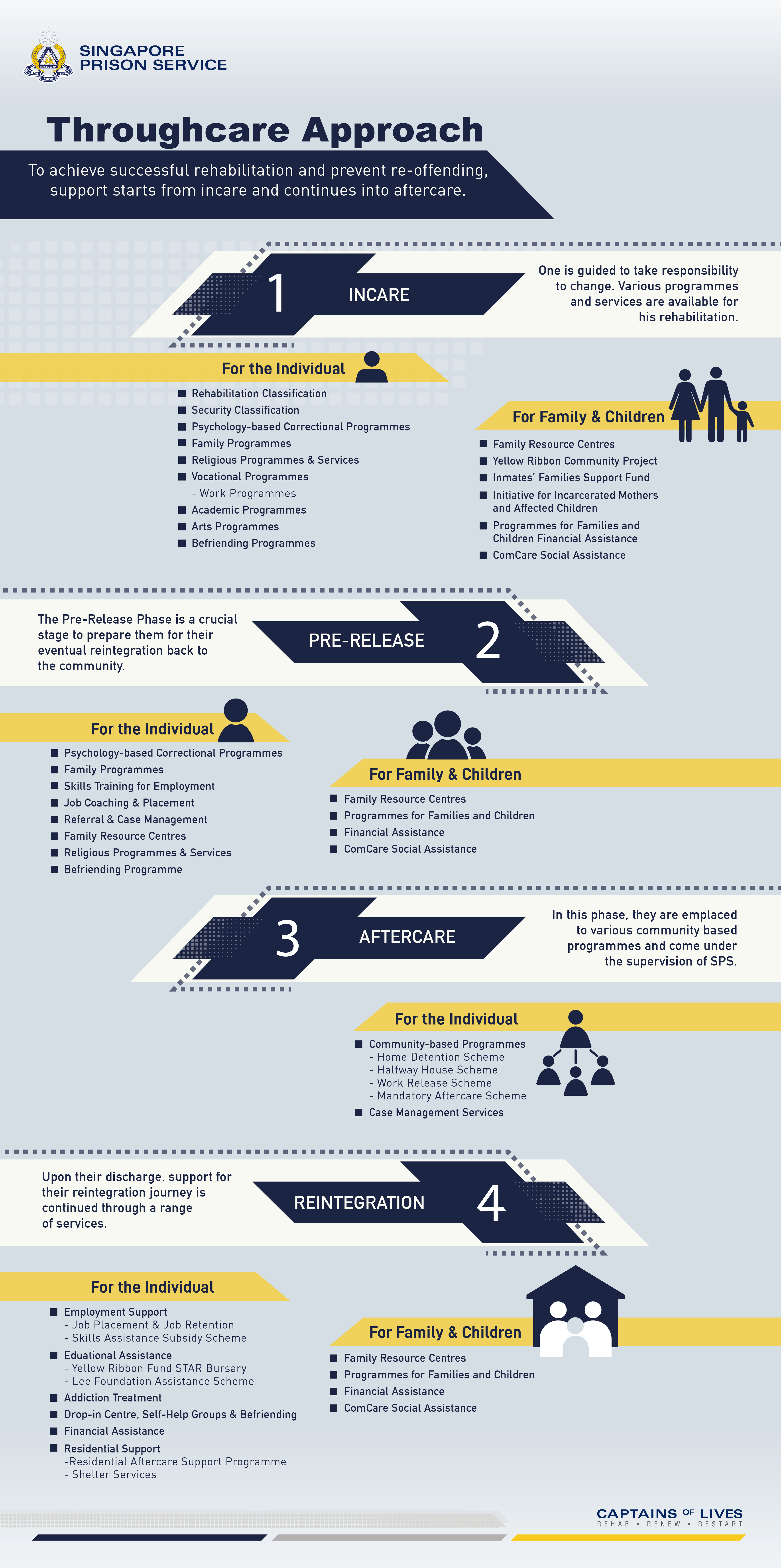SPS Rehabilitation and Reintegration Approach
SPS Rehabilitation and Reintegration Approach
The SPS Rehabilitation and Reintegration approach guides SPS and community partners’ collective rehabilitation and reintegration efforts.
SPS adopts a seamless throughcare approach where there are continuous and coordinated efforts to address the risks and needs of inmates while they are inside prison, which is followed through in the community upon their release. It is multi-faceted and considers how inmates as individuals interact with their
eco-system.
The journey involves many different levels of agents of change, such as
- Inmates
- Captains of Lives
- Family members
- Employers
- Volunteers
- Community partners
- Desistors
-
At the core of any change journey is the individual themselves – individuals must accept responsibility and be motivated to initiate and sustain change in their lives. By cultivating a transformative environment in prison, SPS encourages inmates to take ownership of their lives and develop a pro-social identity.
At SPS, we prepare inmates for their reintegration as active members of society through various programmes. Keeping the dierent needs of each individual in mind, we conduct a range of correctional programmes: psychology-based correctional programmes, family programmes, work programmes, vocational training and education.Risk Needs Responsivity Model, Strength-based and Desistance Theories
 Singapore Prison Service’s rehabilitation approach is informed by various established models, including Risk Needs Responsivity (RNR) and desistance theories, seeking to address the inmate’s offending risks, rehabilitation and reintegration needs, leveraging on social and community networks, to prevent re-offending.
Singapore Prison Service’s rehabilitation approach is informed by various established models, including Risk Needs Responsivity (RNR) and desistance theories, seeking to address the inmate’s offending risks, rehabilitation and reintegration needs, leveraging on social and community networks, to prevent re-offending.Psychology-Based Correctional Programmes
Inmates can attend Psychology-Based Programmes, enhancing their motivation to address and change their criminal thinking patterns.
My Action Plan
 My Action Plan is a planning tool that helps inmates chart their goals towards rehabilitation, encouraging them to take greater ownership of their own journey.
My Action Plan is a planning tool that helps inmates chart their goals towards rehabilitation, encouraging them to take greater ownership of their own journey.Vocational and Skills Training
SPS partners with Yellow Ribbon Singapore to improve inmates’ capabilities through skills training and provide career opportunities for them to reintegrate into society.
-
Forming new and healthy social networks is vital for inmates in their reintegration journey. SPS supports them through creating opportunities for them to strengthen familial bonds, develop prosocial networks and prevent intergenerational offending.
Within the prison, many agents of change play a role in the development of prosocial relations, including the inmates themselves, Captains of Lives (COLs), community partners and volunteers. Outside the prison, these reintegration efforts are supported by family members, our community partners, and volunteers who are inmates’ motivation to stay on the right path.COLs as Role Models
 Captains of Lives (COLs) are often the first agent of change for inmates. They embody SPS’s mission and core values in their daily interactions with the inmates to instil discipline, meaningfully engage them, and inspire change.
Captains of Lives (COLs) are often the first agent of change for inmates. They embody SPS’s mission and core values in their daily interactions with the inmates to instil discipline, meaningfully engage them, and inspire change.Family members as reasons to change
SPS recognises that family support is important in the inmates’ rehabilitation and reintegration journey.
SPS involves the family members of inmates as key agents of change through family-centric rehabilitation programmes, letter correspondences, and visits. This helps inmates prepare for their reintegration so they can return to a supportive family network upon release.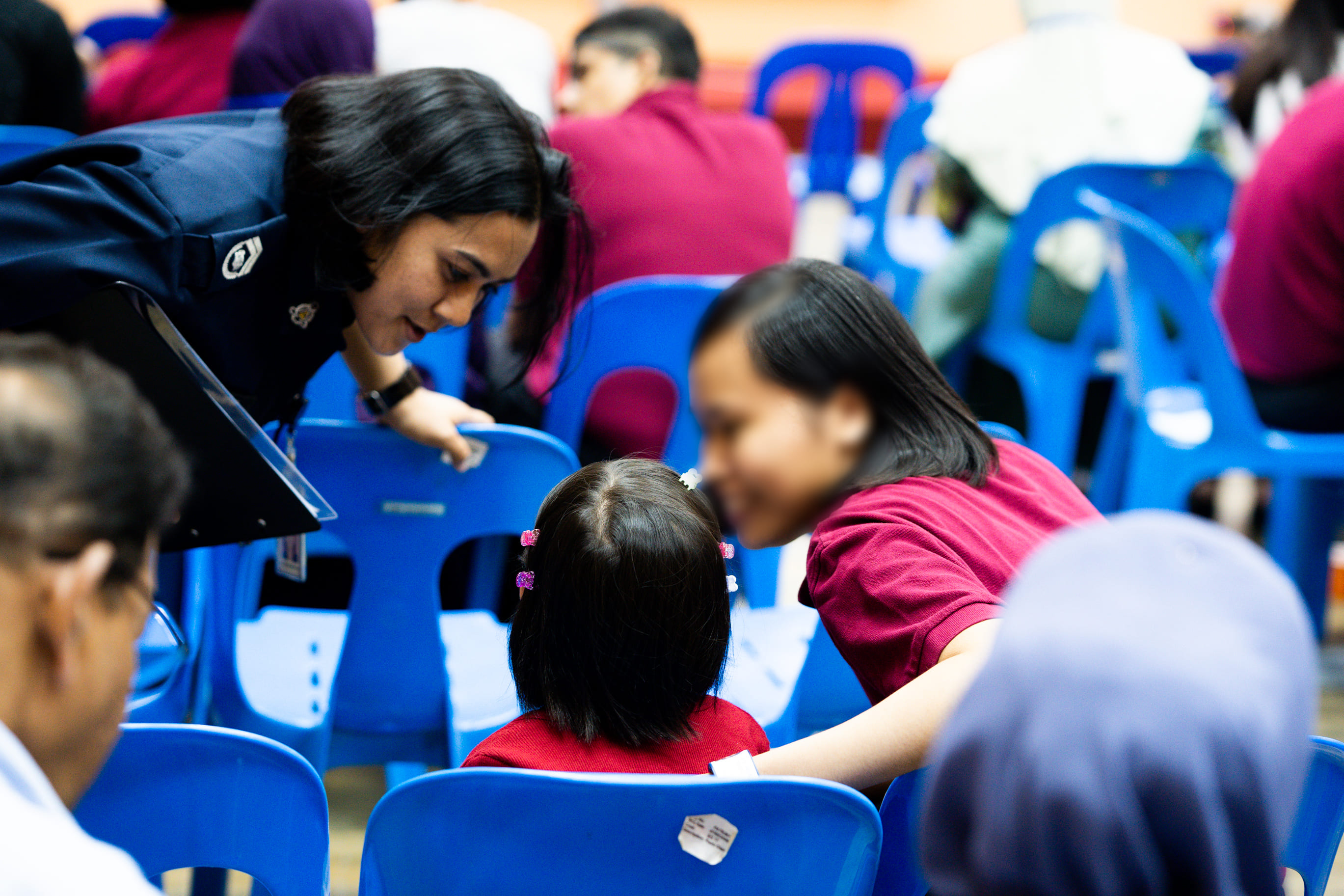
Volunteers who expand prosocial networks
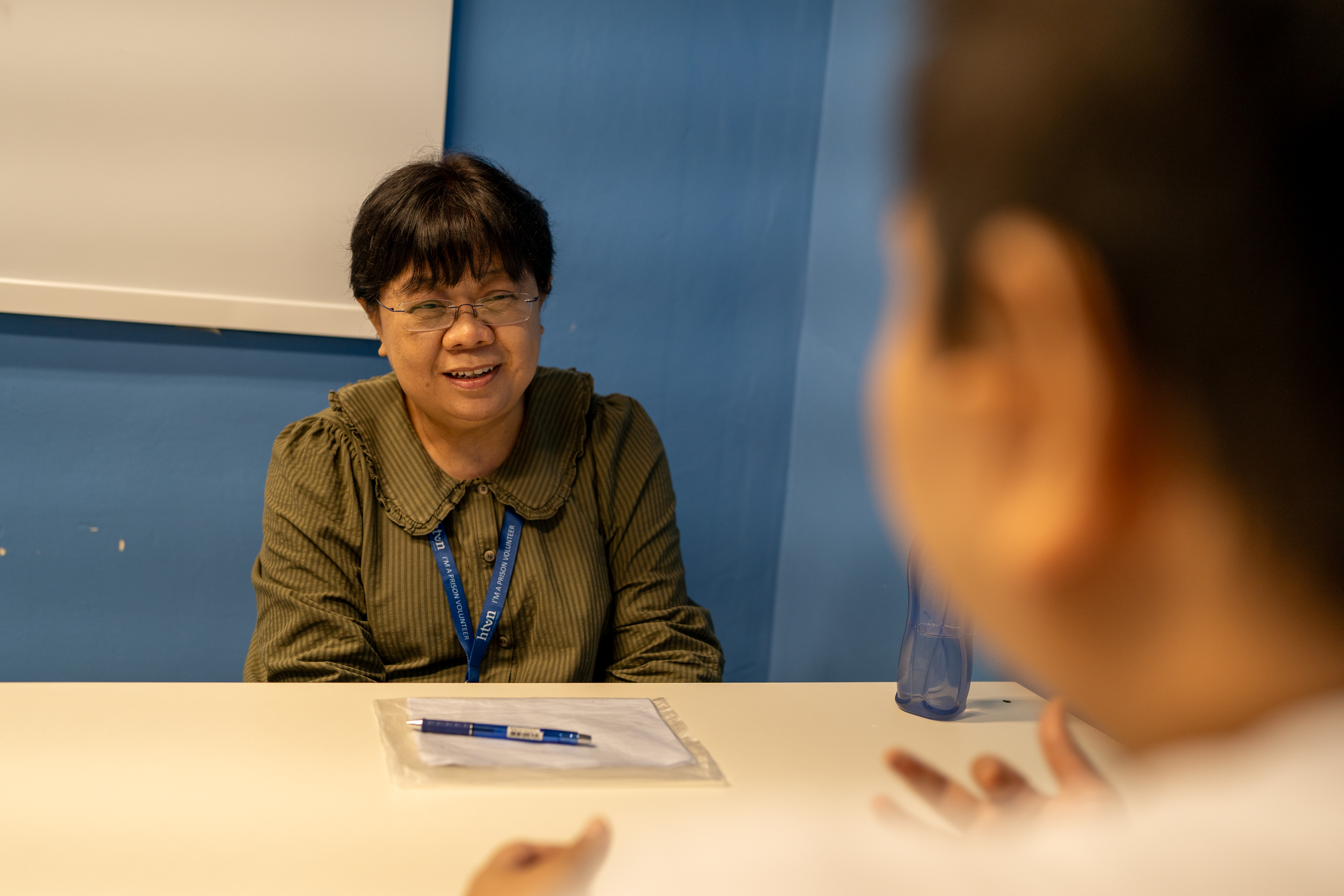 Volunteers are crucial community partners who inspire change in inmates and expand their prosocial networks. They complement SPS’s rehabilitation efforts through structured religious and secular programmes and offer reintegration support upon inmates’ release.
Volunteers are crucial community partners who inspire change in inmates and expand their prosocial networks. They complement SPS’s rehabilitation efforts through structured religious and secular programmes and offer reintegration support upon inmates’ release. -
To reduce long-term re-offending rates, a strong support system within the community is essential. This involves collaboration between community partners, employers, families, and government agencies to promote desistance.
At SPS, we encourage community involvement by working with community partners and volunteers to other structured programmes to support inmates’ reintegration. Our efforts also extend to their families, who play an integral role in the rehabilitation journey. Tailored support is also provided by specific communities to provide more targeted intervention for inmates.Community-Based Programmes (CBPs) and Halfway Houses
 CBPs promote the reintegration of inmates by allowing suitable inmates to serve the tail-end of their sentence/detention in the community.
CBPs promote the reintegration of inmates by allowing suitable inmates to serve the tail-end of their sentence/detention in the community.
Under the Halfway House Service Model, SPS partners 9 halfway houses to support the reintegration of supervisees into the community.Desistor Network
Desistor Network aims to create a strong network where agencies who work with and support desistors can tap on one another’s strengths, experience, and resources to expand the range of support activities available to desistors and ex-offenders.
Throughcare Volunteer Framework (TVF)
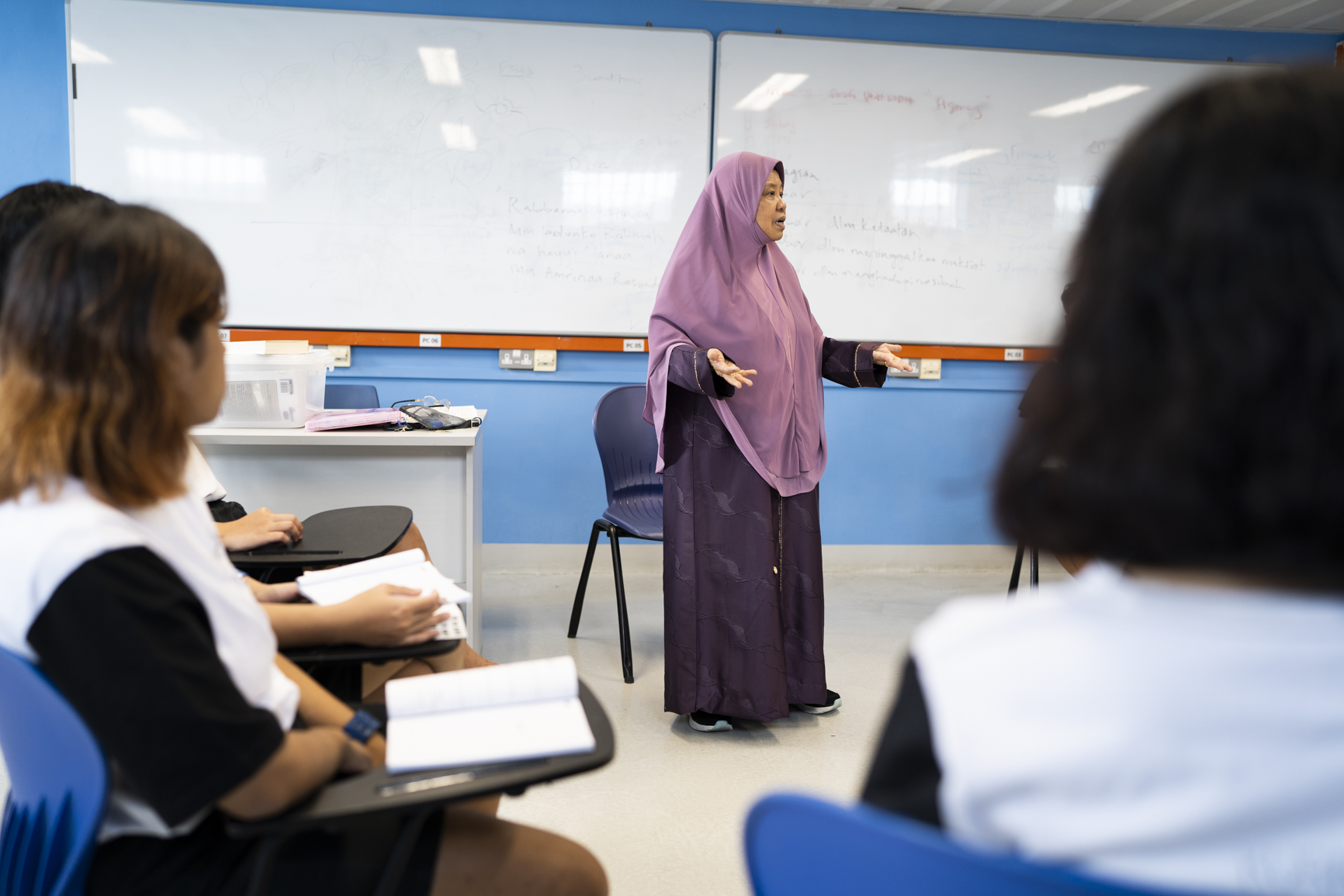 TVF volunteers engage with inmates throughout the entire rehabilitation journey, both Incare and Aftercare, providing a more pro-social support network upon their release.
TVF volunteers engage with inmates throughout the entire rehabilitation journey, both Incare and Aftercare, providing a more pro-social support network upon their release.Yellow Ribbon Community Project (YRCP)
This grassroots-led project provides support and assistance to inmates and their families, allowing them to focus on reintegrating back into society.
SPS also engages Family Service Centres (FSCs) to perform family case management to support inmates’ families with community resources.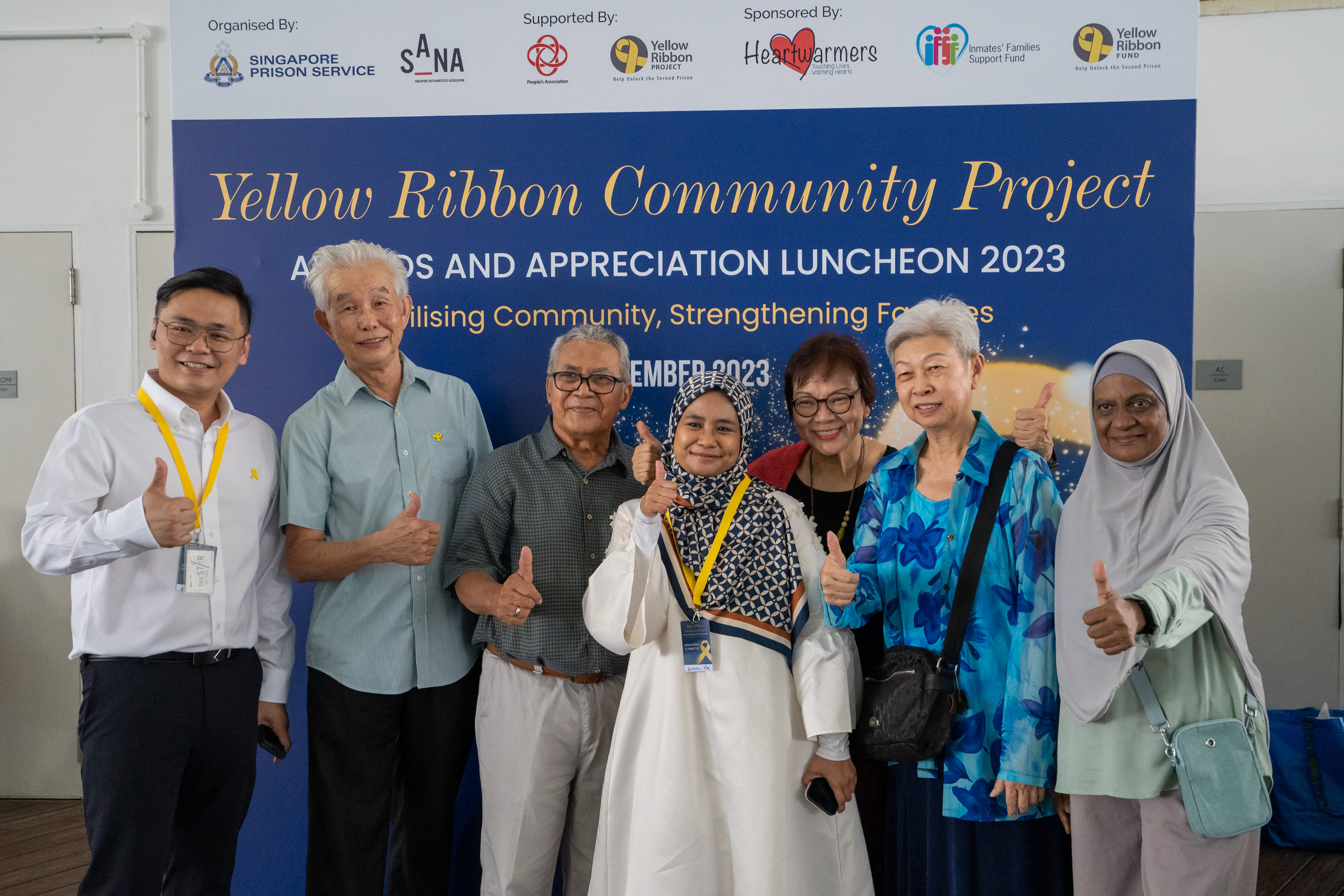
-
SPS and Yellow Ribbon Singapore, working as part of the Community Action for the Rehabilitation of Ex-Offenders (CARE) Network, aim to influence societal changes to shape an inclusive society that accepts and support ex-offenders and their families.
We aim to expand awareness of rehabilitative efforts and build up public trust and acceptance of ex-offenders reintegrating into society. To do so, we partner with the public, employers, schools, community partners and government agencies to support ex-offenders in the reintegration process, improving their social mobility as they work towards becoming contributing members of society.CARE Network
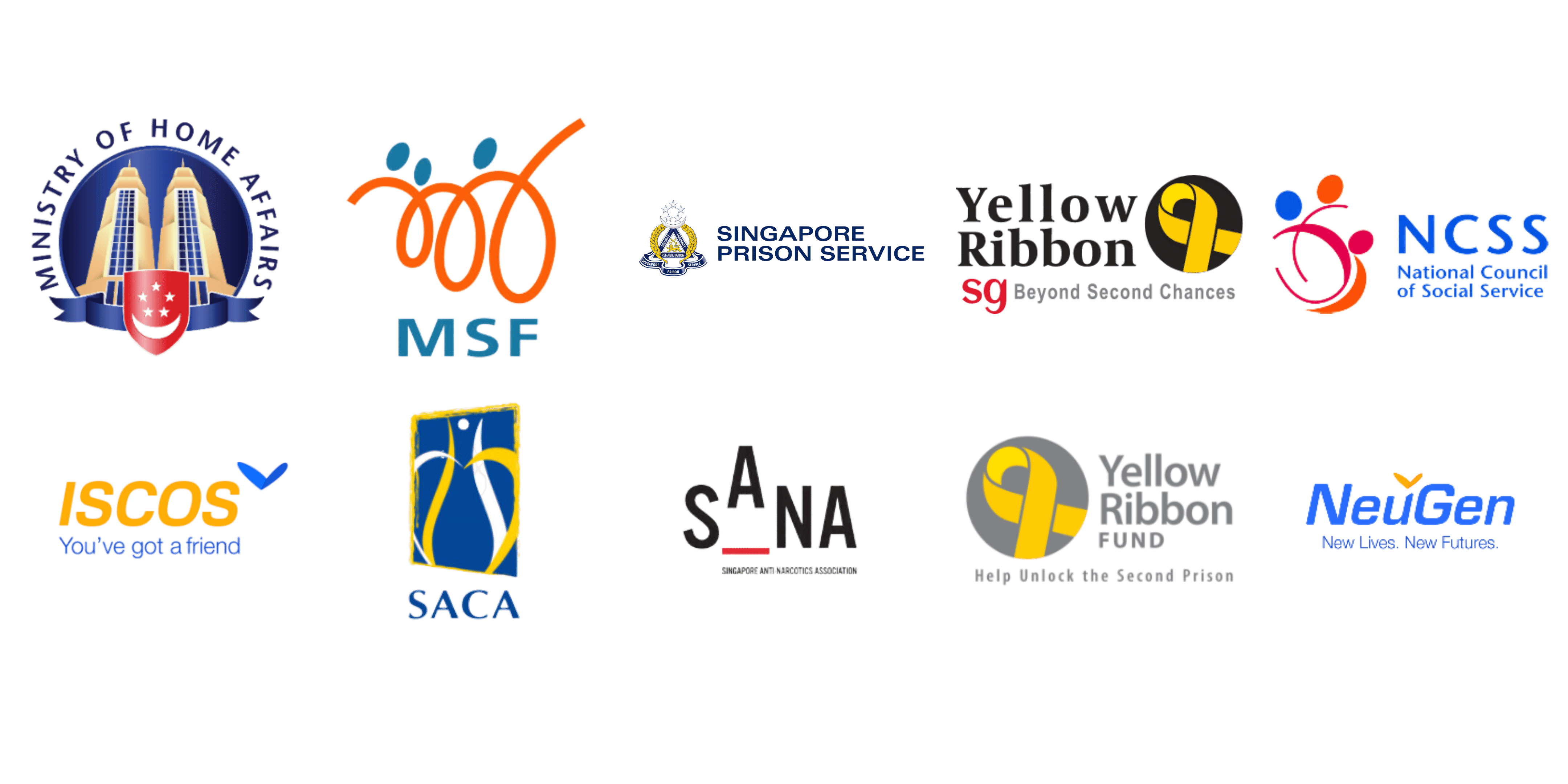 CARE Network (CN) brings together community partners and government organisations to support the smooth transition from incare to aftercare, providing ex-offenders and their families the support they need after release.
CARE Network (CN) brings together community partners and government organisations to support the smooth transition from incare to aftercare, providing ex-offenders and their families the support they need after release.
As part of CN, there are dedicated charitable funds such as Yellow Ribbon Fund and NeuGen Fund that support the development an implementation of programmes and services for inmates, ex-offenders, and their families.Employers
YRSG partners with over 6,200 companies to give ex-offenders a second chance to rebuild their careers. To make this possible, YRSG matches ex-offenders to suitable job openings and equips them with necessary skills through training, career guidance and job retention support.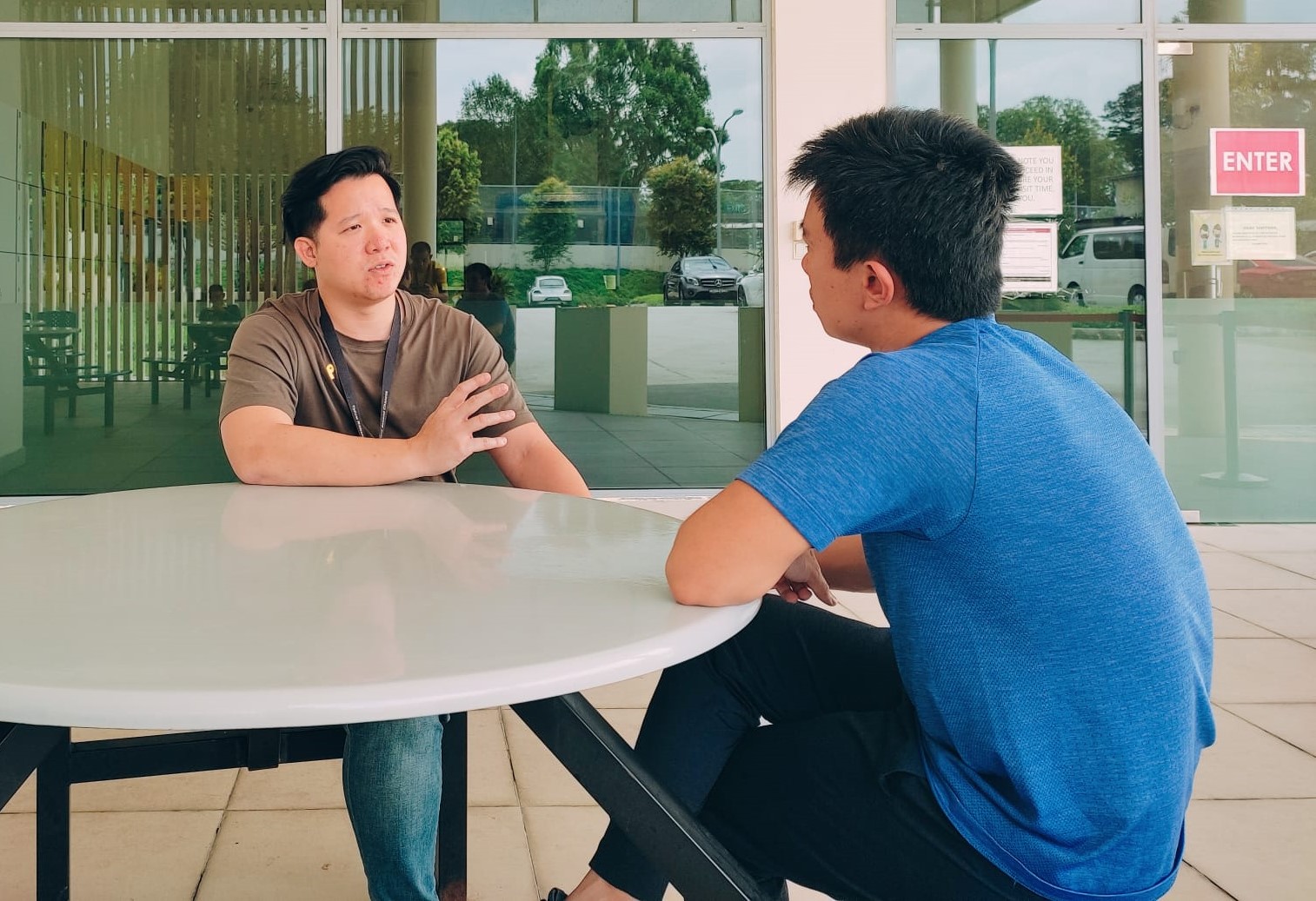
Yellow Ribbon Project
 The Yellow Ribbon Project highlights the importance of giving ex-offenders a second chance and welcoming them back into society. It promotes the 3 ‘A’s needed to improve support for ex-offenders: raising Awareness, generating Acceptance and inspiring community Action.
The Yellow Ribbon Project highlights the importance of giving ex-offenders a second chance and welcoming them back into society. It promotes the 3 ‘A’s needed to improve support for ex-offenders: raising Awareness, generating Acceptance and inspiring community Action.



